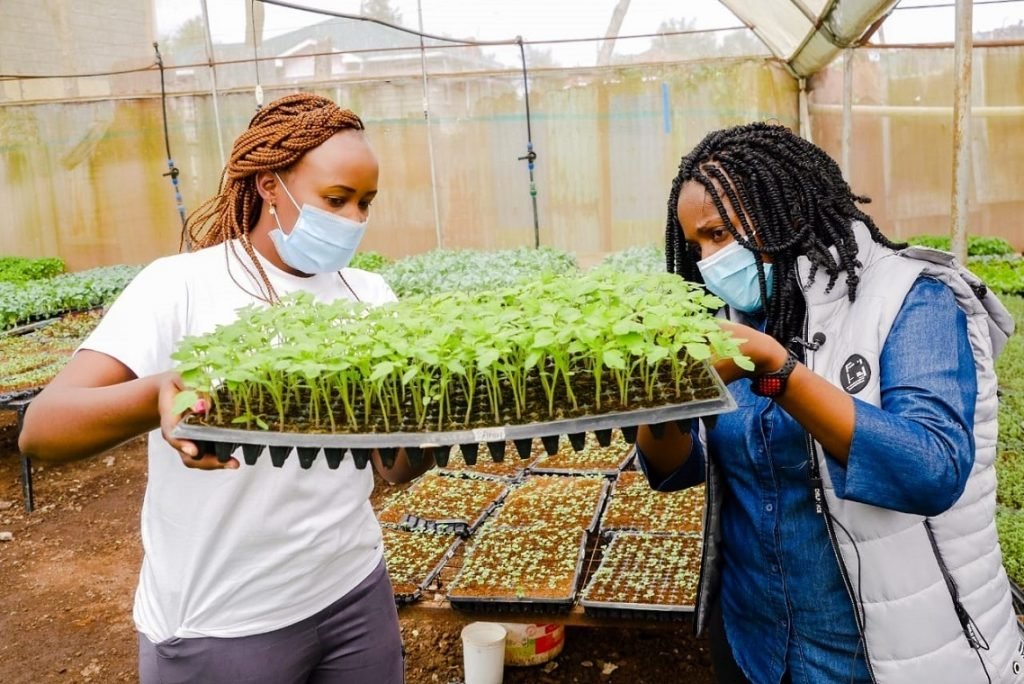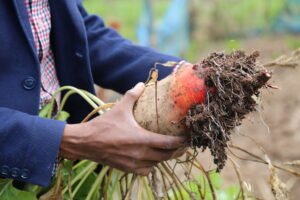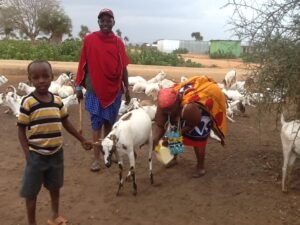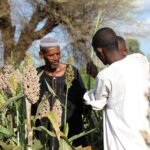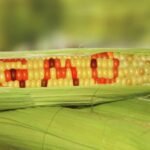By Verenardo Meeme, Rootooba, 22 June 2020
The Kenyan government has established guidelines on simple technologies for producing nutritious foods at the household level in response to the COVID-19 pandemic through the Ministry of Agriculture.
By following the guidelines, growers will preserve food and maintain healthy eating during the pandemic through consistent availability of nutritious foods. The Ministry says.
One of the techniques being championed by the government at household level is the use of micro-gardens. According to FAO, micro-gardens are small production units that can yield a wide range of vegetables, roots and tubers, and herbs in small spaces, such as balconies, patios, and rooftops.
Ann Nyaga, chief administrative secretary of the Ministry of Agriculture, Livestock, Fisheries, and Cooperatives, explains that the micro-gardening uses containers such as plastic-lined wooden crates, custom-built tables, old car tyres, sacks, plastic containers like yogurt cups, water bottles, tins, flower pot, buckets, and even old denim jeans and gumboots.
The technique integrates horticulture production practices with environmentally friendly technologies suited to small spaces, such as rainwater harvesting and household waste management. Households can grow fast-maturing vegetables such as cowpeas leaves, amaranth, managu, sagaa, pumpkin leaves, cucumber, okra, courgette, mushroom, tomato, hoho, dhania, spring onions and fruits such as strawberries within the compound. The ministry of agriculture, livestock, and fisheries Nyaga informed.
This approach drastically reduces the frequency of market visits, directly supporting the socio distancing rules set by the ministry of health and meant to reduce the spread of the Corona Virus.
“They fit the urban context, where limited space and scarcity of water prevail, and they can support household food and nutrition needs during emergencies,” Nyaga said.”Micro-gardens allow low-income families to meet their needs for vitamins, minerals, and plant protein by providing direct access to fresh, nutritious vegetables every day,” “They can also offer a source of extra income from the sale of small surpluses hence reducing the cost of purchasing foods.” Nyaga continued.
“Households can maintain healthy eating during COVID 19 by ensuring the constant availability of nutritious foods at the household level. A healthy diet can be achieved through subsistent production of fast-maturing nutritious foods using space and water-efficient technologies”. “Own production reduces the need to frequent the market and hence maintain social distancing,” Nyaga explains.
Jane Wambugu, an extension and agricultural economics specialist, of the Ministry of Agriculture, Livestock, Fisheries, and Cooperatives, says fifteen thousand households have been identified by the Ministry of Agriculture drawn from pilot counties of; Kajiando, Bomet, Muranga, Nyeri, Nyandarua, Tharaka Nithi, Meru, Taita, Makueni, Kitui and Machakos who will access the programme package.
Already, farmers have received seeds and trained on how to apply various best agronomic practices. ‘‘the guide has simplified the best practices in integrated pest management training modules. Jane adds. Other guidelines for sustaining healthy diets at the household level outlined in the guide include; guidelines on the preservation of fresh vegetables and fruits using cooling pots, freezing vegetables for a more extended period and drying fruits and vegetables, and meat to increase shelf life. The preservation techniques reduce damages that are triggered by enzymes within fruits and vegetables that catalyze the deterioration process, along with exposure to food spoilage bacteria and mould; exposure to high temperatures—these result in rotting, and wilting that lead to reduced safety and quality and subsequent income losses,” Nyaga said.
The guidelines come when farmers are grappling with disruptions in the food supply chain due to the ministry of health’s guidelines on closure of some markets, socio distancing rules, and restricting travel across counties and between countries, except under exceptional circumstances.
Maintaining a healthy diet is an integral part of supporting a robust immune system. A healthy diet is one that factors in quantity and quality to achieve optimal growth and development of an individual and supports functioning and physical, mental, and social wellbeing at all life stages. Nyaga observes.
Japhet Mutugi, a 32-year-old farmer in Ntharene Meru County, who grows various leafy vegetables on his kitchen garden in his compound, observes that during COVID 19, there has been a shift in commodity preference and affordability, with consumers buying essential vegetables, such as onions, and holding off on higher-priced items due to economic uncertainty.
“The lockdown and curfew hours have hit the fresh vegetable farmers hard,” he said, explaining that vegetables are typically sold in the evening due to hot daytime temperatures that wilt the produce.

